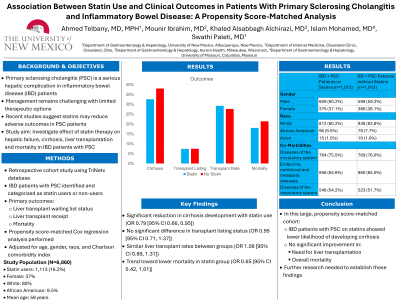Tuesday Poster Session
Category: Liver
P4670 - Association Between Statin Use and Clinical Outcomes in Patients With Primary Sclerosing Cholangitis and Inflammatory Bowel Disease: A Propensity Score-Matched Analysis
Tuesday, October 29, 2024
10:30 AM - 4:00 PM ET
Location: Exhibit Hall E


Ahmed Eltelbany, MD, MPH
University of New Mexico
Albuquerque, NM
Presenting Author(s)
Ahmed El Telbany, MD, MPH1, Mounir Ibrahim, MD2, Khaled Alsabbagh Alchirazi, MD3, Islam Mohamed, MD4, Swathi Paleti, MD1
1University of New Mexico, Albuquerque, NM; 2Cleveland Clinic Foundation, Holmdel, NJ; 3Aurora Healthcare, Milwaukee, WI; 4University of Missouri - Kansas City School of Medicine, Kansas City, MO
Introduction: Primary sclerosing cholangitis (PSC) is a serious hepatic complication affecting patients with inflammatory bowel disease (IBD). PSC management remains challenging, with limited therapeutic options and poor prognosis. Recent studies suggest that statins may reduce the risk of adverse outcomes in PSC patients. This study investigates the effect of statin therapy on hepatic failure, cirrhosis, liver transplantation and mortality in IBD patients with PSC.
Methods: We conducted a retrospective cohort study using a large, nationally representative database, TriNetx to evaluate the effect of statin on hepatic failure, transplantation, and mortality in IBD patients with PSC. IBD patients with PSC were identified and categorized as statins users or non-users based on medication records. The primary outcomes were patients on the waiting list for liver transplant, those who received a liver transplant, and mortality. Patient demographics, co-morbidities, medications, and colonoscopy outcomes were extracted. Propensity score-matched Cox regression analysis (Table 1) was performed to adjust for potential confounders including age, gender race and charlson comorbidity index. E-values were calculated to assess the robustness of the findings.
Results: A total of 6,860 IBD patients with PSC were identified of which 1,113 (16.2%) were on statins. A propensity-score matched analysis did not show a significant difference between the two groups. Among these patients 37% were females, 80% were white and 9.5% were African American with a mean age of 59 years. In the IBD with PSC on statins group, 32.55% of the patients developed cirrhosis compared to 38% in the nonstatin group odds ratio (OR) 0.79 [95% CI 0.66, 0.95], p< 0.011). Among the patients who were on the waiting list for liver transplant 7.41% were in the statin group compared to 7.51% in the non-statin group OR 0.99 [95% CI 0.71, 1.37], p = 0.93). For liver transplants, 29.25% of patients in the statin group received a transplant compared to 27.67% in the non-statin group OR 1.08 [95% CI 0.89, 1.31], p = 0.43). Mortality was 18.08% in the statin group compared to 21.44% in the non-statin group (OR 0.65 [95% CI 0.42, 1.01], p = 0.057).
Discussion: In a large, propensity score-matched cohort, IBD patients with PSC who were on statins were less likely to develop cirrhosis however, it did not significantly improve the prognosis regarding the need for liver transplantation or overall mortality. Further research is needed to establish these findings.
Note: The table for this abstract can be viewed in the ePoster Gallery section of the ACG 2024 ePoster Site or in The American Journal of Gastroenterology's abstract supplement issue, both of which will be available starting October 27, 2024.
Disclosures:
Ahmed El Telbany, MD, MPH1, Mounir Ibrahim, MD2, Khaled Alsabbagh Alchirazi, MD3, Islam Mohamed, MD4, Swathi Paleti, MD1. P4670 - Association Between Statin Use and Clinical Outcomes in Patients With Primary Sclerosing Cholangitis and Inflammatory Bowel Disease: A Propensity Score-Matched Analysis, ACG 2024 Annual Scientific Meeting Abstracts. Philadelphia, PA: American College of Gastroenterology.
1University of New Mexico, Albuquerque, NM; 2Cleveland Clinic Foundation, Holmdel, NJ; 3Aurora Healthcare, Milwaukee, WI; 4University of Missouri - Kansas City School of Medicine, Kansas City, MO
Introduction: Primary sclerosing cholangitis (PSC) is a serious hepatic complication affecting patients with inflammatory bowel disease (IBD). PSC management remains challenging, with limited therapeutic options and poor prognosis. Recent studies suggest that statins may reduce the risk of adverse outcomes in PSC patients. This study investigates the effect of statin therapy on hepatic failure, cirrhosis, liver transplantation and mortality in IBD patients with PSC.
Methods: We conducted a retrospective cohort study using a large, nationally representative database, TriNetx to evaluate the effect of statin on hepatic failure, transplantation, and mortality in IBD patients with PSC. IBD patients with PSC were identified and categorized as statins users or non-users based on medication records. The primary outcomes were patients on the waiting list for liver transplant, those who received a liver transplant, and mortality. Patient demographics, co-morbidities, medications, and colonoscopy outcomes were extracted. Propensity score-matched Cox regression analysis (Table 1) was performed to adjust for potential confounders including age, gender race and charlson comorbidity index. E-values were calculated to assess the robustness of the findings.
Results: A total of 6,860 IBD patients with PSC were identified of which 1,113 (16.2%) were on statins. A propensity-score matched analysis did not show a significant difference between the two groups. Among these patients 37% were females, 80% were white and 9.5% were African American with a mean age of 59 years. In the IBD with PSC on statins group, 32.55% of the patients developed cirrhosis compared to 38% in the nonstatin group odds ratio (OR) 0.79 [95% CI 0.66, 0.95], p< 0.011). Among the patients who were on the waiting list for liver transplant 7.41% were in the statin group compared to 7.51% in the non-statin group OR 0.99 [95% CI 0.71, 1.37], p = 0.93). For liver transplants, 29.25% of patients in the statin group received a transplant compared to 27.67% in the non-statin group OR 1.08 [95% CI 0.89, 1.31], p = 0.43). Mortality was 18.08% in the statin group compared to 21.44% in the non-statin group (OR 0.65 [95% CI 0.42, 1.01], p = 0.057).
Discussion: In a large, propensity score-matched cohort, IBD patients with PSC who were on statins were less likely to develop cirrhosis however, it did not significantly improve the prognosis regarding the need for liver transplantation or overall mortality. Further research is needed to establish these findings.
Note: The table for this abstract can be viewed in the ePoster Gallery section of the ACG 2024 ePoster Site or in The American Journal of Gastroenterology's abstract supplement issue, both of which will be available starting October 27, 2024.
Disclosures:
Ahmed El Telbany indicated no relevant financial relationships.
Mounir Ibrahim indicated no relevant financial relationships.
Khaled Alsabbagh Alchirazi indicated no relevant financial relationships.
Islam Mohamed indicated no relevant financial relationships.
Swathi Paleti indicated no relevant financial relationships.
Ahmed El Telbany, MD, MPH1, Mounir Ibrahim, MD2, Khaled Alsabbagh Alchirazi, MD3, Islam Mohamed, MD4, Swathi Paleti, MD1. P4670 - Association Between Statin Use and Clinical Outcomes in Patients With Primary Sclerosing Cholangitis and Inflammatory Bowel Disease: A Propensity Score-Matched Analysis, ACG 2024 Annual Scientific Meeting Abstracts. Philadelphia, PA: American College of Gastroenterology.
